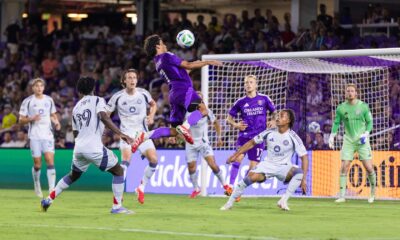Orlando City
Orlando City vs. Colorado Rapids: Player Grades and Man of the Match
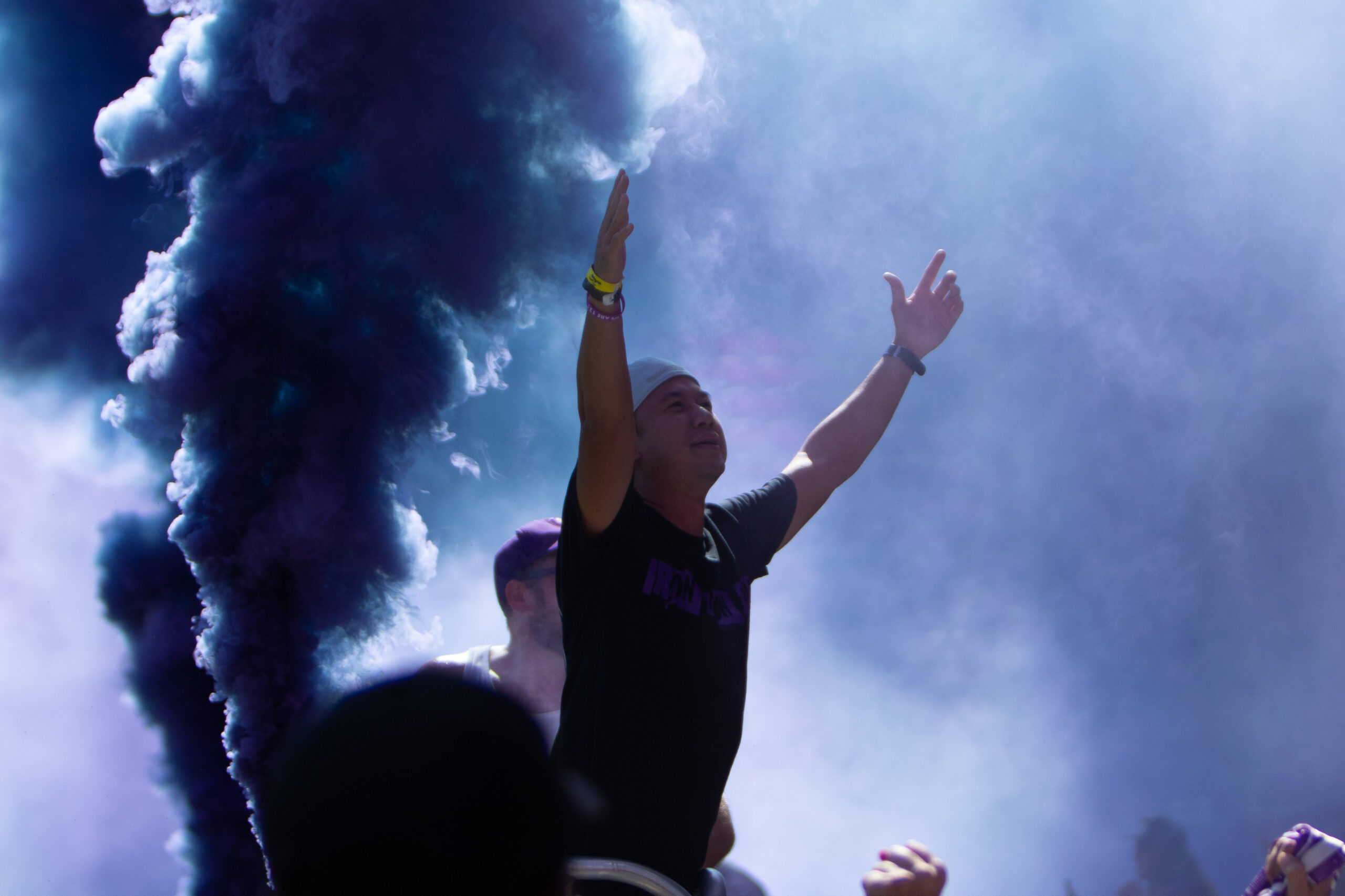
Orlando City finally snagged that elusive first home win of 2019 in last night’s 4-3 win over the Colorado Rapids. I’ve never gone whitewater rafting, but they say it’s a fun, wild ride. That’s a pretty good description of last night’s game as well. Ideally the Lions won’t be conceding quite so many goals typically, but since the final score went the right direction, I’m willing to overlook that.
When speaking to reporters after the match, Nani mentioned the team had been pressing and feeling a bit of pressure to deliver a win to the home fans. He said that now that the team has crossed that bit of business off the list, maybe they can play more relaxed and deliver more results. Let’s hope that’s the case, because winning at home >>>> losing or drawing at home.
But enough preamble. Let’s get to the individual player grades from last night’s game.
Starters
GK, Brian Rowe, 6 — While I wouldn’t say any of the three goals were on bad goalkeeping errors per se, Rowe would probably say he should maybe have done better on the first goal. If he couldn’t beat Kei Kamara to the spilled ball in the box on the first goal, he might have at least come off his line and made himself big to pressure the Rapids striker. He went long quite often but his passing percentage should ideally still be better than the 23.8% he produced last night. He also stayed a bit deep in his area a few times when he could possibly have snuffed out some danger before it became a problem. Still, he had a vital punch that could have led to a counter-attack if not for a Colorado foul and he made a couple of nice saves, considering the weather conditions and the wet ball, including a free header thumped low by Kamara in the second half.
D, Robin Jansson, 5.5 — The Swede had a difficult night against Colorado at times. The first goal hit off his head and fell in behind him but I’m sure he was screened by the leaping Lamine Sané on the play. He fell for a fake by Cole Bassett on the third Colorado goal and allowed the midfielder to cut back inside where he had a much better angle. His passing accuracy wasn’t great (74.2%) but he did lump some long balls forward, which contributed to that. His four clearances led the team and he added two interceptions. It wasn’t a terrible performance but he was as much affected by the rotation to a four-man back line as anyone.
D, Lamine Sané, 6 — If Sané had been one inch taller (or able to leap one inch higher), Kamara wouldn’t have opened the scoring nine minutes in. The French-Senegalese center back still had a decent game overall, with a tackle, three interceptions, and three clearances. His 77.5% passing rate led the back line, including the wingbacks. Even his 4/9 accuracy on long balls outshone his fellow defenders. Still, he got pulled out of shape a few times in the game, but he wasn’t alone in that.
D, Carlos Ascues, 5 — It was a short night for the Peruvian, who left the game at half an hour with a hamstring injury after getting tangled up with a Colorado player while running down a loose ball. He touched the ball just 20 times and his passing rate was just 53.8%, which was worst on the team in the first half. He was OK defensively (one blocked shot, two clearances) and helpful in moving the ball, but it wasn’t the best outing of his time in Orlando, nor his worst, but the shape change after his injury hurt the defense.
WB, Joao Moutinho, 6.5 — A somewhat chaotic night in defense prevented this score from being higher, but I thought Joao played well overall. He certainly drifts too far inside on defense sometimes and occasionally gets caught up the pitch too far, but I think that’s because he’s used to playing wingback, which seems a more natural position for his skill set than fullback. Last night he was asked to play fullback after the Ascues injury and there were some shaky moments defending. However, he’s also a good ball winner, leading all players in tackles in the game (7). He contributed two interceptions, notched an assist on his one chance created, and generally helped facilitate the attack. But there were a few bad touches on switches in the first half that broke down attacks, a poor back pass that almost went horribly wrong, and some poor positioning to offset some of the good he did.
MF, Sacha Kljestan, 6.5 — The mustachio’d one doesn’t do a lot of flashy things on the pitch and he may frustrate some fans, but I’ll bet James O’Connor is happy to have him. Kljestan finished second on the team in touches, with his 79 being just one fewer than Ruan’s 80. The ball finds him often and that’s because he puts himself in the right spots and because his teammates rely on him to connect the lines. He attempted one shot (which was blocked) and created two chances on the offensive end. His gorgeous chip pass over the top to spring Ruan started the sequence that led to the penalty on Axel Sjoberg — and ultimately to Nani’s game-winning penalty kick. He hit a pretty decent 80% of his passes and chipped in a tackle and an interception on defense.
MF, Nani, 8.5 (MotM) — With two goals and a hockey assist, it was a big night for Nani and it pushed him over the top for my Man of the Match. The Portuguese star man finally opened his Orlando City account with a nice header in front of goal. It wasn’t the most difficult goal he’s scored in his career, but he made no mistake on the opportunity. He played a great ball to Dwyer in the 43rd but Dom’s shot was blocked. He was calm and collected on his penalty, sending Tim Howard the wrong way. He lulled the defense to sleep at one point and then fizzed a cross through the six but nobody made a run to get onto it, so maybe he also mesmerized his teammates. His 87.5% passing rate was among the best on the team, he created two chances, and he got two of his three shots on goal (scoring on both). He also often tracked back and helped defensively.
MF, Sebas Mendez, 6 — While Mendez’s 94.4% passing accuracy stands out, he also had a couple of bad giveaways in the game. He was dispossessed twice and had two bad touches and seemed a bit late closing down a few times. He finished with two tackles and seemed to have trouble getting on the ball at times. It’s easy to forget how young he is and although he and Moutinho may be inconsistent at times, they’ve got a ton of upside and that showed through for the most part last night.
WB, Ruan, 8 — The highway patrol would like you to know that speed kills and watching Ruan play shows that’s absolutely the case on the soccer pitch. The Brazilian gave Dillon Serna fits throughout the first half, got to the end line repeatedly, and sent several dangerous passes into the area. He figured heavily in three of Orlando’s four goals. On the first, he fizzed a cross through Tesho Akindele’s legs that should have been tapped home, but the ball found Moutinho on the other side and he crossed in for Nani. Ruan roasted the Rapids on a counter attack off a Rapids corner kick to help set up Akindele’s goal. Finally, his cross late in the game led to the handball that Nani converted. He literally played Serna off the pitch by halftime, drew a yellow card on Kamara, and led the team in touches. He needs to improve his passing accuracy (67.5%) and defending, but his pace changes the game and Orlando wouldn’t have won last night without him. Defensively, he had four tackles, two interceptions, and a clearance.
F, Tesho Akindele, 8 — There were a couple of spells where the Canadian seemed to disappear from the proceedings last night but overall he was very good in his return from a hamstring issue. He scored the second goal and assisted on the third, but he was also important on aerial balls, winning a team high six of them. He passed at an 83% clip, which is a high rate for a striker. He created four chances, took three shots (one on frame), and even defended well, making three tackles and an interception. His only true misstep was getting himself nutmegged two yards out by Ruan’s cross on the buildup to the first goal, but at least Moutinho and Nani bailed him out for that miss.
F, Dom Dwyer, 6.5 — Dwyer was active all night but somehow didn’t figure in any of the scoring. He fired seven shots to lead all players and got four of them on frame, forcing two pretty good saves from Tim Howard. But he also knocked a header right at Howard from only a few yards out and completely missed the gaping empty net on the play that ended up as the handball on Sjoberg, so it’s a good thing that was spotted by Jair Marrufo to avoid him the embarrassment of the miss. He had one clearance on the defensive end, hit 70% of his pass attempts, and drew two free kicks.
Substitutes
MF, Oriol Rosell (30’), 6 — Uri came on for Carlos Ascues and O’Connor changed the shape to go four at the back. Rosell had a mixed night. He tied for second on the team in tackles and passed well (85.7%) but he also gambled and lost on a midfield ball that led to Colorado’s second goal and he was left to try to defend Kamara on an aerial attempt at the back somehow as the defense got pulled out of shape and, well, he didn’t do a great job of it. At least Rowe made the save. Mostly Uri had a decent night but there was room for improvement.
F, Chris Mueller (80’), 8.5 — It’s not easy to get a really high grade for essentially 10 minutes of work, but Cash did it. He scored his second goal of the year just a minute after getting on the pitch, and he darted and dashed around with the ball in the offensive end, bending the Colorado defense out of shape. He had 12 touches and eight passes (87.5% accuracy) in his short time on the pitch and he terrorized the Rapids in that time. He created one scoring chance, got his one shot on target, and beat one of the legendary American goalkeepers for a huge game-changing goal.
WB, Kyle Smith (90’+2), N/A — Smith came on for Nani in stoppage time as more of a time-wasting substitution than anything. He didn’t even touch the ball in about two minutes on the pitch so there’s really no way to give him a grade for the appearance.
That’s how I saw the performances on a rainy Saturday night in Orlando against the Rapids. Let me know where you agree and/or disagree in the comments below and be sure to vote for your Orlando City Man of the Match in the poll below.
Polling Closed
| Player | Votes |
| Ruan | 26 |
| Nani | 102 |
| Chris Mueller | 53 |
| Joao Moutinho | 7 |
| Tesho Akindele | 0 |
| Other | 2 |
Opinion
Orlando City Has Been Better than Expected Halfway Through the Season
While there was plenty to worry about at the start of the season, Orlando has had a good first half of 2025.
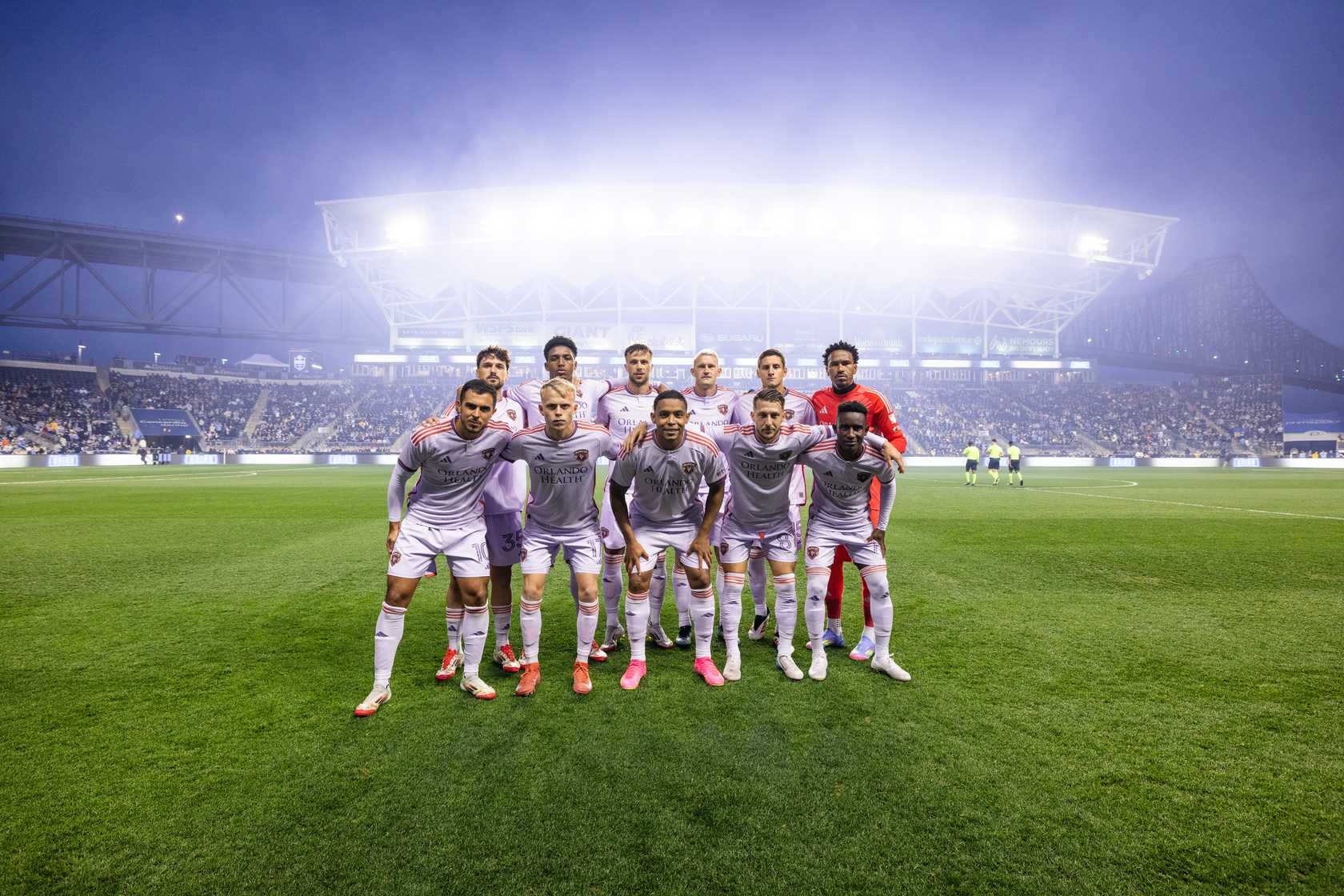
With 18 matches in the books, we’ve moved just past the halfway point of the 2025 Major League Soccer season, and based off my feelings before Orlando City played its opening game of the season, the Lions have performed above expectations so far. There were plenty of valid reasons to be concerned heading into the year. Orlando had sold its all-time leading goal scorer, and there were questions about whether he’d been adequately replaced. There were worries about depth at multiple positions, and the defense was coming off an uncharacteristically poor year. Here we are though, with the Lions sitting fifth in the Eastern Conference, just three points out of second place and seven points out of first. So how did we get to this point?
For one thing, Marco Pasalic has been much better than I (and I think a lot of other people) expected him to be. The Croatian has six goals and four assists across 18 matches, and is second on the team in both categories. He scored 10 goals in 49 appearances in the Croatian first division before coming to Orlando and was extremely one-footed, which was enough evidence to sow real doubt about whether he could adequately replace the impact of Facundo Torres.
So far, it’s mostly been so good. His direct style of play is a good complement to the styles of Martin Ojeda and Luis Muriel, and he’s largely hit the ground running in a league that can be difficult to adapt to. It hasn’t been perfect, as he’s still very one-footed, and can sometimes disappear if he’s stringently man marked, but on the whole there’s been much more good than bad.
Speaking of Ojeda and Muriel, they’ve also had strong years. Ojeda in particular has continued his great second half of the 2024 season and has nine goals and five assists in 18 games to show for it. He looks fast, confident, and decisive and is a far cry from the player who struggled frequently during his first year as a Lion. Muriel has cooled off a little after a scorching start to 2025, but he still has six goals and three assists in 18 matches. He looks vastly improved from last year, when he looked a little off the pace of play and quickly lost the starting striker role. He still has a tendency to not be as selfish as he needs to be in front of goal, but he’s been much better than 2024.
I mentioned depth being a big concern, and not just at one position. At the beginning of the season Orlando City was, and arguably still is, thin at striker, center back, defensive midfield, and fullback. Duncan McGuire was injured to start the year and is now injured again, leaving Orlando with two true strikers in Muriel and Ramiro Enrique. There was no true backup left back, only one reliable backup center back, and Dagur Dan Thorhallsson starting at right back meant that defensive midfield depth consisted of rookie Joran Gerbet and the Swiss army knife that is Kyle Smith.
Things have mostly worked out though. David Brekalo has supplanted Rafael Santos, meaning the Brazilian is now a proven backup option at the position, and Smith has filled in there as well. That means that in games in which Rodrigo Schlegel or Robin Jansson are unavailable, Brekalo fills in at center back, Santos starts at left back, and Smith is the backup for both positions, so it isn’t a flawless system. Gerbet has been playing better and better and got some valuable minutes when Eduard Atuesta and Cesar Araujo were unavailable. His emergence has been a crucial piece of the puzzle this year. So too has the rise of Alex Freeman, as his locking down the right back role has allowed Thorhallsson to fill in at defensive midfield, attacking midfield, and right back. The situation isn’t perfect, as a couple untimely injuries to the wrong guys would leave the Lions looking pretty threadbare, but so far it’s just about worked.
Another big concern was the defense. The Lions conceded 50 goals in the regular season last year, which was tied for the second-most of any Eastern Conference playoff team and fourth-most of any playoff team. With no defensive signings and the aforementioned depth concerns, there were plenty of reasons to worry about Orlando’s ability to keep the ball out of the back of the net.
Things have looked much better in 2025, though. The 22 goals OCSC has conceded are the fifth-fewest in the league, and Pedro Gallese’s eight clean sheets are tied for most in the league. Aside from a few egregious defensive performances against the Philadelphia Union, Atlanta United, and the Chicago Fire, things have mostly been tidy at the back, and when they haven’t been, El Pulpo has been around to pick up the slack. Again, things haven’t been perfect, as there have been moments where individual and collective errors have hurt the team, but it’s been better.
I thought the Lions would struggle this year. Going into the start of the season, we were talking about a team that lost Torres, arguably didn’t do enough to strengthen the team across the board, was facing depth issues, and was dealing with a leaky defense — all while pretty much every other contender in the East got stronger on paper. Instead, OCSC tied a club-best unbeaten streak and is just three points out of second place.
That being said, the East is so tight that Orlando is only five points above the playoff line, and injuries to the wrong guys could easily topple the fragile ecosystem that is the depth chart, but so far things are going better than I thought they would be. There are still a lot of matches to play, but this isn’t a bad position to be in at the halfway mark.
Lion Links
Lion Links: 6/20/25
Orlando Pride take on Racing Louisville FC tonight, Orlando Pride players called up by Zambia, USMNT beats Saudi Arabia, and more.
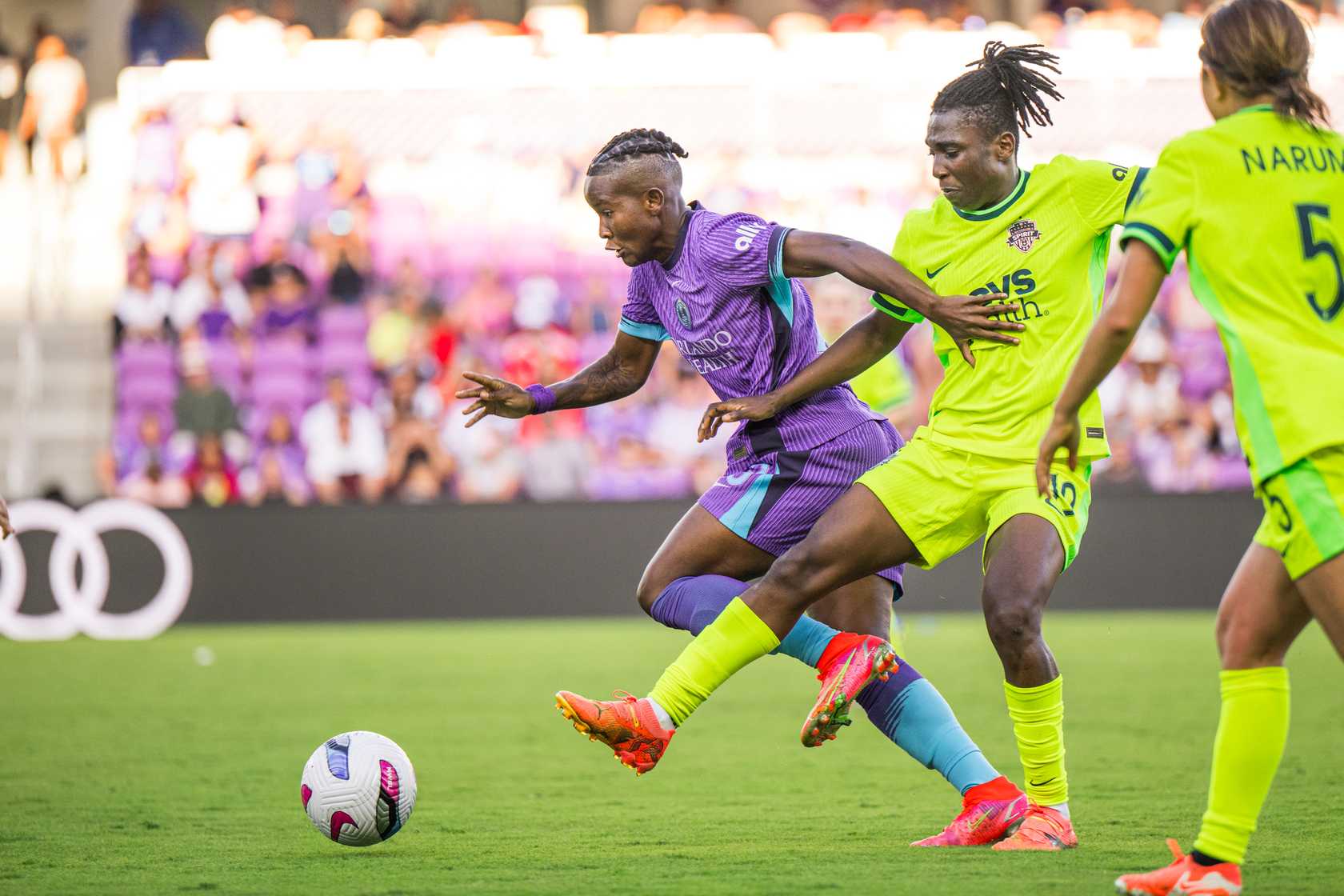
Happy Friday! June continues to fly by as we enjoy the buffet of soccer here in the U.S. this month. I’ll be spending most of the weekend working, but I am hoping to get some reading done after being gifted some books for my birthday. But enough about me, let’s jump right into today’s links!
Orlando Pride Face Racing Louisville Tonight
The Orlando Pride are on the road tonight for a match against Racing Louisville FC at 8 p.m. in the final game before a league break until August. Going into the break with four straight wins would be nice for the Pride, but they’ve struggled at Lynn Family Stadium over the years. Louisville enters this match following a 4-2 loss to the league-leading Kansas City Current and has scored eight goals over the past three games. Orlando’s defense has been phenomenal this year, conceding just eight goals this season and only one during this win streak. Midfielder Cori Dyke spoke on how the team is finding its groove and shutting out opponents.
Zambia Calls Up Orlando Pride Trio
Barbra Banda, Grace Chanda, and Prisca Chilufya were all called up for Zambia’s CAF Women’s Africa Cup of Nations roster ahead of this summer’s tournament. Banda has eight goals this season with the Pride and had four goals at last year’s Olympics, including a hat trick against Australia. The Copper Queens claimed third place in the 2022 edition of this tournament, and they’ll need to be at their best to win this summer against tough opponents like South Africa and Nigeria. Zambia’s tournament campaign will kick off on July 5 against the host nation, Morocco.
USMNT Beats Saudi Arabia to Qualify for Quarterfinals
The United States Men’s National Team won 1-0 against Saudi Arabia to clinch a spot in the quarterfinals of this year’s Concacaf Gold Cup. After a scoreless first half, the Yanks broke through in the 63rd minute thanks to a free kick. Sebastian Berhalter served the ball on a silver platter to Chris Richards, who buried it for the crucial goal. The defense did well to secure its second shutout of the tournament, with Orlando City’s Alex Freeman starting at right back yet again. The USMNT will play Haiti on Sunday and should be able to win the group for a smoother path in the knockout stage.
FIFA Club World Cup Roundup
An MLS club finally won a game during this year’s FIFA Club World Cup, with Inter Miami beating Porto 2-1 in Atlanta. Lionel Messi scored the winner from a free kick to complete the comeback after conceding an early goal. The Seattle Sounders had a rougher day, falling 3-1 to Atletico Madrid, with Pablo Barrios scoring a brace. Former Lion Facundo Torres started for Palmeiras in the Brazilian club’s 2-0 win over Egypt’s Al Ahly.
Today’s action features more soccer at Inter&Co Stadium, with Benfica and Auckland City squaring off in the City Beautiful. Our Michael Citro will be on hand to report on it. Elsewhere in the U.S., Chelsea will take on Flamengo, LAFC will face ES Tunis, and Bayern Munich will play Boca Juniors.
Free Kicks
- Canada Head Coach Jesse Marsch, who is already serving a suspension for misconduct during the Nations League, is under investigation by Concacaf for incidents during this Gold Cup. Reports detail that Marsch disregarded regulations and used offensive language toward match officials.
- Kylian Mbappe was discharged from the hospital after suffering from a case of gastroenteritis. It’s unclear if or when he’ll play for Real Madrid during the Club World Cup.
- Carlos Cuesta was hired as Parma’s next head coach after five years with Arsenal as an assistant coach. The 29-year-old becomes the second-youngest coach in Serie A history.
- Manchester City was fined over $1 million by the English Premier League for repeated delays regarding kickoff times.
That’s all I have for you all today. I hope you all have a fantastic Friday and rest of your weekend!
Orlando City
In 2025, OCSC Stands for Orlando City Scorers Club
How Orlando City’s top offensive performers this season compare to the rest of MLS…and the Premier League.
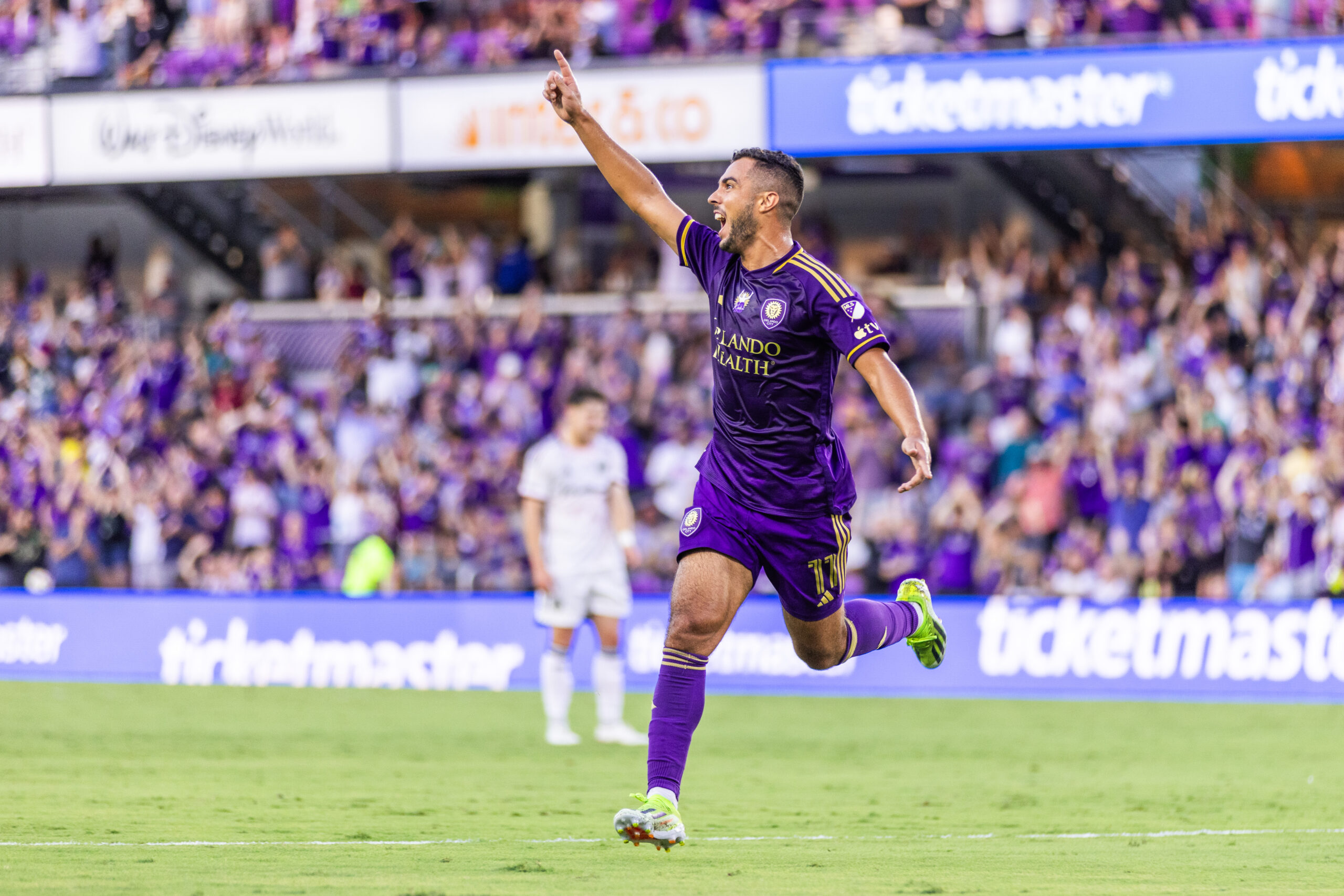
Last week, I wrote about the state of Orlando City at the halfway point of the season, focusing mostly on the team’s accomplishments on offense and defense through 17 games. For this week, let’s look at some of the top performing Lions, because it’s always fun to talk about offensive success. I do not apologize if you take offense to my desire to only focus on offense, because that would be defensive, and there is no place in this article for defense.
Many moons ago, back in January during the preseason, I wrote an article looking at the best offensive seasons in Orlando City’s MLS history. I used a derived metric called game score to rank the seasons, and I’ll quickly explain again how that is calculated:
Goals Scored + Expected Assists + 0.0113 (Progressive Carries + Progressive Passes)
I went into much more detail about why that is the calculation in the original article, but the quick and dirty version is that scoring goals, completing passes to players in dangerous scoring areas, and progressing the ball by dribbling and passing are core components of a strong offensive player. Think of the game score as an offensive value calculation, and think of it simply as a value for which more is better and the most is best.
Opta only tracked the last three contributing statistics (expected assists, progressive carries, and progressive passes) from 2018 onwards, and the chart below shows Orlando City’s 10 best MLS regular seasons since 2018. It also shows the season that currently ranks 11th — Martín Ojeda’s 2025 season, which, as a reminder, is only in game 18 of a 34-game regular season. This means, if you get the extrapolation machine out, Ojeda is on pace for a season-long game score of 26.5, which would rank as the highest full season game score in Orlando City history.
| Player | Season | Season Game Score | Rank in MLS | MLS Best that Season |
|---|---|---|---|---|
| Nani | 2019 | 22.0 | 8 | 50.7 |
| Facundo Torres | 2023 | 20.9 | 10 | 31.1 |
| Facundo Torres | 2024 | 20.0 | 21 | 32.6 |
| Facundo Torres | 2022 | 17.4 | 25 | 33.7 |
| Duncan McGuire | 2023 | 16.3 | 26 | 31.1 |
| Nani | 2021 | 16.2 | 26 | 26.6 |
| Sacha Kljestan | 2018 | 15.6 | 46 | 38.0 |
| Chris Mueller | 2020* | 14.8 | 11 | 21.8 |
| Yoshimar Yotún | 2018 | 14.7 | 53 | 38.0 |
| Dom Dwyer | 2018 | 14.3 | 58 | 38.0 |
| Martín Ojeda | 2025** | 14.1 | 4 | 16.8 |
- * The 2020 season contained only 23 games due to COVID-19
- ** Ojeda’s stats are through 18 matches; MLS teams have played between 16-19 matches
Ojeda’s 14.1 currently ranks only behind Sam Surridge of Nashville (15.7), Anders Dreyer of San Diego (16.6), and some player from Miami who clearly wants to play for Orlando since he has lion as part of his first name (Messi, 16.8). During Ojeda’s first two seasons, he only accumulated 12.1 and 12.5, respectively, so this is already by far his best season in purple and it is just barely halfway complete.
Ojeda is not the only Orlando City player who is on pace to jump into the club’s all-time top 10 by the end of the season, as teammates Luis Muriel (10.76, on pace for 20.3) and Marco Pašalić (10.46, on pace for 19.8) are both in the top 30 in MLS this season. Muriel is 24th, and Pašalić is 27th. Orlando City is the only team in the league with three players in the top 30, or really the top 27 (shout out to my son, for whom 27 is his favorite number).
One last point on Ojeda: if we were to extrapolate his performance through 18 games to 38 games, his season game score would bump up to 29.6. Why did I choose 38? Well, 38 happens to be the number of games played in the world’s most popular league, England’s Premier League. I am well aware that the Premier League is a different level of competition than MLS, but just for fun I ran the numbers on the 2024-2025 Premier League season, and a season-long game score of 29.6 would coincidentally also rank Ojeda fourth in England, right behind Cole Palmer (29.7) and in front of Alexander Isak (29.2). I do not think Ojeda would actually finish fourth if he was in the Premier League, but my point is more that the frequency of Ojeda’s contributions for Orlando City thus far this season have been similar to that of Palmer for Chelsea and Isak for Newcastle, which is pretty heady company.
Speaking of heady, we also need to talk about the player who is leading Orlando City in aerial duel wins, Alex Freeman. Heady, aerial duels…you got the segue, right? Don’t answer that.
Freeman has been on a rocket ship in the last year, going from Orlando City B starter to Orlando City starter to U.S. Men’s National Team starter, and he likely will also be the MLS All-Star Game starter, too. My mention of his leading the team in aerial duel wins, while noteworthy, was really just a convenient way to cut over to talking about him and his season-long game score of 8.1.
According to Opta’s positional tracking, only two MLS defenders have accumulated game scores of more than six thus far this season — Philadelphia’s Kai Wagner at 6.88 and Freeman’s 8.1. The extrapolation machine says 8.1 through 18 games puts Freeman on pace for a final score of 15.2, which would be the second best performance by an MLS defender since tracking began in 2018. Freeman is going to miss at least a few more games due to being with the U.S. team during the Gold Cup, so that 15.2 will likely not happen, but wow, what a great first half of a season for Orlando City’s right back.
Going back to the Premier League for comparative context…actually, please sit down and buckle up first. Are you good? Ok.
Going back to the Premier League for comparative context, there is none. Freeman’s performance blows away every defender’s from that league. It will likely surprise few that the defender with the best season game score in the Premier League this season was Trent Alexander-Arnold, who accumulated a score of 13.5 during Liverpool’s championship run. That 13.5 was 15% better than the defender who finished in second place, and yet, if we extrapolate Freeman to 38 games, he would be on pace for 17.0, which is 26% better than Alexander-Arnold. Mind the gap.
Once again, I do not mean to say that Freeman is as skilled or would contribute like Alexander-Arnold did in the Premier League. It is instead that Freeman’s contributions to Orlando City’s offense are unlike that from any defenders in the Premier League. Freeman’s performance thus far this season places him 43rd in the overall MLS rankings, first among defenders, and ahead of strikers such as Christian Benteke, Emmanuel Latte Lath, and Brandon Vazquez. He ranks fourth on Orlando City, and the Lions are not only the only club with three players in the top 30, but also the only club with four players in the top 45.
Two teams had four players in the top 45 during the 2024 MLS season, and one of them was the LA Galaxy, the eventual MLS Cup champions. I am not saying that Orlando City having four players in the top 45 this season means they will win MLS Cup, but I am not not saying it either. I am saying I would like it to happen though, and saying that loudly and clearly.
The game score metric is not the be-all, end-all of measuring offensive prowess, but I think it does a good job of creating a ranking system where the eye test matches the math. Most fans would point to Ojeda as the player who has driven Orlando City’s offense more than any other this season, and being that the team is on pace to have one of the best, if not the best, goal-scoring seasons in the club’s MLS history, it should track that Ojeda is also on pace to have one of the best, if not the best, individual offensive seasons in the club’s MLS history as well.
There are 16 more MLS games to go, and the great thing about sports is that in any game anything can happen, and that is why we love to watch. It is awesome that all three Designated Players and Freeman are off to great starts, but nothing is guaranteed for the back half of the season. That’s why they play the games, as the saying goes. For all we know, Ramiro Enrique could come on like gangbusters in the final games and rip off double-digit goals to end as the team’s leading scorer.
Ramiro, this is a bold strategy, and I am on board for it. The more goals the merrier. Feel free to bring us fans some goals for Christmas in July.
Orlando City does not have a game this weekend, with next match coming June 25 on the road in St. Louis. Winning that game would give the Lions their third winning streak of the season and would be something I would very much like, since I will be doling out the grades for that game. And since I have been writing about the offense this week, how about three goals and three points?
Vamos Orlando!
-

 Local Soccer Events5 days ago
Local Soccer Events5 days agoUlsan HD FC vs. Mamelodi Sundowns FC: Final Score 1-0 as South African Side Wins First FIFA Club World Cup Match in Orlando
-
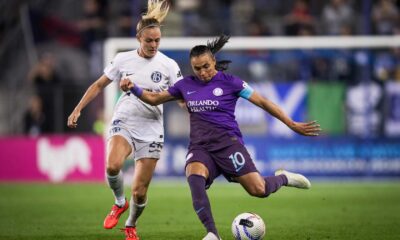
 Orlando Pride1 week ago
Orlando Pride1 week agoOrlando Pride vs. Bay FC: Preview, How to Watch, TV Info, Live Stream, Lineups, Match Thread, and More
-

 Orlando City1 week ago
Orlando City1 week agoOrlando City vs. Colorado Rapids: Final Score 1-0 as Ojeda’s Goal Snatches Road Win for Lions
-
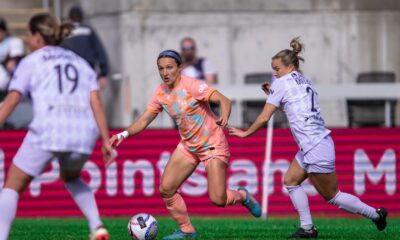
 Orlando Pride2 days ago
Orlando Pride2 days agoOrlando Pride vs. Racing Louisville FC: Preview, How to Watch, TV Info, Live Stream, Lineups, Match Thread, and More
-
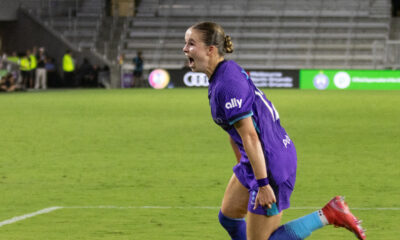
 Orlando Pride2 weeks ago
Orlando Pride2 weeks agoOrlando Pride vs. Houston Dash: Final Score 1-0 as Cori Dyke’s Goal at the Death Lifts Pride
-
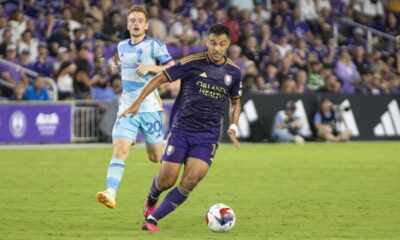
 Orlando City1 week ago
Orlando City1 week agoOrlando City vs. Colorado Rapids: Preview, How to Watch, TV Info, Live Stream, Lineups, Match Thread, and More
-
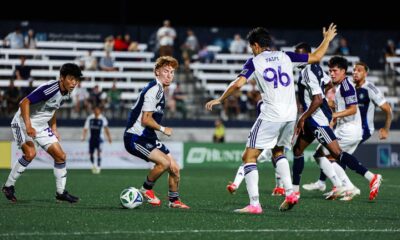
 Podcasts2 weeks ago
Podcasts2 weeks agoPawedCast Episode 484: OCB Beats Huntsville, Alex Freeman’s USMNT Debut, Colorado Preview, and More
-

 Lion Links2 weeks ago
Lion Links2 weeks agoLion Links: 6/9/25




